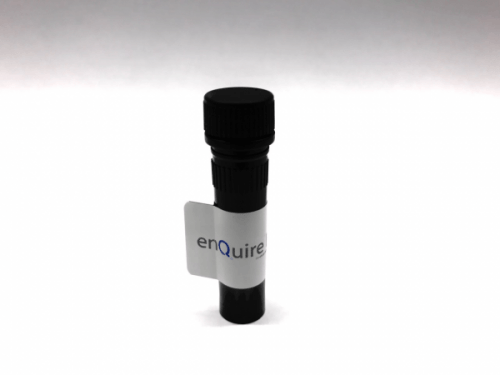Human PDCD4 Recombinant Protein Product Attributes
Product Type: Recombinant Protein
Recombinant PDCD4 based upon sequence from Human
Host: QP12986 protein expressed in E. Coli.
Available Tags: Untagged
Protein Construction: A cDNA sequence encoding the sequence of PDCD4 was constructred and used to recombinantly synthesize the protein.
Recommended Applications: See Application Notes
Application Notes: Please contact us for application specific information for QP12986.
Bioactivity Data: Untested
Amino Acid Sequence: MDVENEQILN VNPADPDNLS DSLFSGDEEN AGTEEIKNEI NGNWISAYSI NEARINAKAK RRLRKNSSRD SGRGDSVSDS GSDALRSGLT VPTSPKGRLL DRRSRSGKGR GLPKKGGAGG KGVWGTPGQV YDVEEVDVKD PNYDDDQENC VYETVVLPLD ERAFEKTLTP IIQEYFEHGD TNEVAEMLRD LNLGEMKSGV PVLAVSLALE GKASHREMTS KLLSDLCGTV MSTTDVEKSF DKLLKDLPEL ALDTPRAPQL VGQFIARAVG DGILCNTYID SYKGTVDCVQ ARAALDKATV LLSMSKGGKR KDSVWGSGGG QQSVNHLVKE IDMLLKEYLL SGDISEAEHC LKELEVPHFH HELVYEAIIM VLESTGESTF KMILDLLKSL WKSSTITVDQ MKRGYERIYN EIPDINLDVP HSYSVLERFV EECFQAGIIS KQLRDLCPSR GRKRFVSEGD GGRLKPESY
Purity: Greater than 90.0% as determined by:(a) Analysis by RP-HPLC. (b) Analysis by SDS-PAGE.
Reconstitution Instructions: |||
Endotoxin Levels: Not Determined. Testing recommended prior to use in cell culture and can be performed upon request.
Buffer: The protein solution contains 20mM Tris-HCl pH 8.0, 1mM DTT and 0.1M sodium chloride.
Storage Conditions: Store at 4°C if entire vial will be used within 2-4 weeks. Store, frozen at -20°C for longer periods of time. For long term storage it is recommended to add a carrier protein (0.1% HSA or BSA). Avoid multiple freeze-thaw cycles.
Physical Appearance: Sterile Filtered colorless solution.
| Recombinant Human PDCD4 General Information | |
|---|---|
| Alternate Names | |
| Programmed cell death protein 4, Nuclear antigen H731-like, Neoplastic transformation inhibitor protein, Protein 197/15a, PDCD4, H731, MGC33046, MGC33047. | |
| Molecular Weight | |
| 51 kDa | |
| Curated Database and Bioinformatic Data | |
| UniProt ID(s) | Q53EL6 |
| General Description of Recombinant Human PDCD4. | |
| Human PDCD4 produced in E. Coli is a single, non-glycosylated polypeptide chain containing 469 amino acids and having a molecular mass of 51 kDa. | |
Limitations and Performance Guarantee
enQuire Bio’s products are guaranteed and approved for RESEARCH USE ONLY or manufacturing purposes. This product may not be used as a pharmaceutical agent, or other product intended for human consumption without meeting additional regulatory requirements. This product is guaranteed to work for a period of two years when stored at -70C or colder, and one year when aliquoted and stored at -20C.




Reviews
There are no reviews yet.